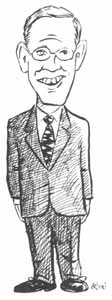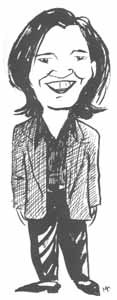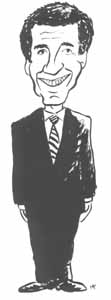FEATURE

No warhorses here If the resumes of past secretaries of state were still a benchmark of qualification to run for that office, Democrat Jesse White and Republican Al Salvi might well be looking for a different job this fall
Story by Dave McKinney
Alan J. Dixon. John W. Lewis. Michael J. Howlett. George H. Ryan. All of these Illinois political figures share a common thread: They became secretary of state during the last 30 years after presiding over a chamber of the General Assembly or being elected to a lower-rung, statewide post. Sometimes both.
If the resumes of these men were a benchmark of qualification to run for secretary of state, Democrat Jesse White and Republican Al Salvi might well be looking for a different job this fall. Indeed, by that standard, the names on the November 3 ballot would be limited to more tested hands like House Speaker Michael Madigan, a Chicago Democrat, House Minority Leader Lee Daniels, an Elmhurst Republican, or, maybe, recently resigned Lt. Gov. Bob Kustra. They share similar backgrounds with Dixon, Lewis, Howlett and Ryan.
George Ryan was House speaker and later served two terms as lieutenant governor before becoming secretary of state in 1991. Dixon was a two-term treasurer and a 20-year legislator before taking over in 1977. Howlett was a three-term auditor of public accounts. And Lewis was a former House speaker and 26-year legislative veteran before finishing out the term of former Secretary of State Paul Powell, who himself was a 30-year legislative veteran before holding the post.
White, the Cook County recorder of deeds since 1993, served in the Illinois House for 16 years. But unlike many past secretaries of state, White has not been a statewide officeholder, nor did he ever preside full-time over his legislative chamber. Salvi had even less time in the Statehouse: four years.
What voters face are two candidates without the same breadth of political experience who are trying to show-as Jim Edgar once did-that a top job in the General Assembly or in a statewide post doesn't have to be a prerequisite to winning one of state government's biggest prizes.
"The days of the warhorse are over. There are none of those left,'' says Paul Green, who directs the Institute for Public Policy and Administration at Governors State in University Park.
Still, the secretary of state's office has a nearly $302 million budget and a workforce numbering more than 3,600. That head count is larger than any other constitutional office, except governor, and represents a potential
16 | October 1998 Illinois Issues
army in future elections. And the office has been a springboard. Dixon went on to become a U.S. senator. He was replaced by Edgar, who sits as one of Illinois' most popular governors. And Ryan is seeking to follow Edgar's path to the Executive Mansion.
"It's a powerful office and a powerful launching pad for Illinois politicians," says John Jackson, a Southern Illinois University political scientist and administrator.
That either White or Salvi got this far would appear to confirm two things. As Green suggests, party leaders have fewer longtime veterans to draw from, and 1990s-style politics is more about personal ambitions and pocketbooks than an established pecking order, where the highest jobs in government go to the senior-most politicos.
"The parties can't control who wins nominations anymore,'' Jackson says. "The parties are so porous that anybody with personality, charisma, name identification and a bankroll can win the nomination. So it's a part of modern politics that party history and party loyalty don't matter that much anymore."
Rather than using their time beneath the Capitol dome as a selling point-neither White nor Salvi seemed to do so during speeches at last August's State Fair-these candidates have embarked on a campaign that focuses on a narrow band of politically popular ideas.
Salvi has floated an untested plan to create a new license plate for education and spin off profits to local school districts. White, a former (continued on page 19)
17 | October 1998 Illinois Issues
 |
Lieutenant governor
In 180 years, Illinois has never had a female lieutenant governor. That political milestone will be established by the winner of the race between Democrat Mary Lou Kearns of St. Charles and GOP state Rep. Corinne Wood of Lake Forest.
Kearns, 54, is a six-term Kane County coroner who narrowly defeated former treasurer Patrick Quinn in a squeaker of a primary earlier this year.
A nurse, Kearns wants to use the office to promote managed care reforms and other health care initiatives. She also would like to expand antigang programs and develop statewide measures to discourage underage drinking.
Wood, 44, is in her first term as a state representative. She was chief sponsor of more bills that passed both legislative chambers and were signed into law than any other freshman House member.
A George Ryan for governor campaign spokesman says Wood, a breast cancer survivor, likely will advocate an array of child care and health care initiatives in the legislature if elected lieutenant governor.
The office's duties are left to the governor to decide. But the lieutenant governor is next in line should the governor become incapacitated, die or resign. The office employs 30 people and has an annual budget of $2.9 million.
|
 |
 |
Treasurer
Two candidates from Chicago's suburbs are doing battle over this post, which some lawmakers want to combine with the state comptroller's office.
GOP incumbent Judy Baar Topinka, 54, of Riverside, is seeking a second term but will have to answer questions about her decision to write off all but $10 million of $40 million in state-backed loans owed the state by politically connected hotel developers. The deal was put on hold.
Topinka recently pushed a $50 million initiative that would provide low-interest loans to day care center developers, a program she wants to expand if elected to another term.
Her Democratic opponent is Orland Park Mayor Dan McLaughlin, who is making his first run for state office. He has moved to make Topinka's hotel loan decision an election issue. In August, he sued her office over the deal.
The treasurer oversees the state's multibillion-dollar investment portfolio. The office employs 102 people and has a $737 million budget, an amount inflated by debt service on general obligation bonds.
|
 |
18 | October 1998 Illinois Issues
baseball player, wants some of his sports friends to sign the backs of driver's licenses to help promote organ donations. Salvi wants to make paroled sex offenders register more often for their licenses to better track their movements. White wants to make school buses safer by creating a cabinet-level post in the secretary of state's office to oversee bus operations. Both want to replace Illinois' aging license plates but don't agree on how to pay for it. And both favor making field-sobriety tests mandatory during drunk-driving stops.
Salvi, 38, does not see his relative inexperience in Springfield as a disadvantage. Instead, he says he carries a fresh perspective that is "good for democracy."
"I've served in the legislature. I've run for statewide office. I'm the father of six kids, successful in the private sector, and was very active in the legislature. I go forward with a solid record, and therefore the thing that will win or lose is who has the best ideas,'' he says.
"I think people generally like the idea of independent-type public servants serving in a position like this.''
Salvi, an attorney, was elected to the House in 1992 and re-elected in 1994. Perhaps the biggest mark he left was his sponsorship of Secretary of State Ryan's "Deadbeats Don't Drive" legislation, which aims to strip driving privileges from parents who are more than 90 days behind on child support. Courts generally have not made wide use of the 2-year-old law.
Without even two full terms under his belt, Salvi embodied the definition of "independent" when, against the wishes of his party's elders, he embarked on a bid for U.S. Senate in 1996. With the help of a big conservative vote, Salvi stunned the party favorite, Kustra, in the primary before losing to Democrat Richard Durbin in the general election. If he wins this election, pundits view him as a possible candidate for governor or U.S. Senate in 2002, though Salvi says his only focus is on winning November 3.
"I've learned in life that if you're looking at your second step, you'll trip over the first step,'' Salvi says. "I can't commit one way or another. I'm focused entirely on winning this race."
 |
Attorney general
Attorney General Jim Ryan of Bensenville will have the advantage of incumbency as he battles Democrat Miriam Santos, who is seeking to become the first Hispanic American and the first woman elected to the post.
Ryan, 52, gained national prominence in trying to help broker a settlement between 40 states and the tobacco industry that would recover some of the states' smoking-related Medicaid costs. Earlier in his term, he blocked a proposed state loan settlement with politically connected hotel developers William Cellini and Gary Fears. Ryan's personal life has generated significant public sympathy. Besides battling his own cancer, he endured the loss of his 12-year-old daughter, Anne Marie, and a major heart scare for his wife, Marie.
Ryan has proposed legislation to allow crime victims to get a telephone call from the state whenever their assailants leave prison. He also wants to assume control of child support enforcement from the Department of Public Aid.
Santos, 42, who is Chicago's city treasurer, has clashed with Mayor Richard M. Daley but now enjoys his support. In September, her campaign was dealt a blow when she learned the FBI was probing her fund-raising. Agents served her city and campaign offices with subpoenas aimed at finding out whether she improperly sought campaign cash from city contractors. Santos denied wrongdoing and says she'll cooperate.
Santos has laid out a labor-friendly platform that includes promises to attack corporate misconduct during strikes and sue companies that refuse to pay worker's compensation claims.
The attorney general is the state's top elected legal officer. The office employs 716 people and has a $51.4 million annual budget. |
 |
19 | October 1998 Illinois Issues
White, 64, sees secretary of state as the last stop in a political career that began in 1975, when he served one term in the House. In 1979, he returned and began an uninterrupted 14-year run in the House that ended in 1993, when he was elected to the first of two terms as Cook County recorder of deeds.
"It's not a stepping stone for something else to me,'' White says of the secretary of state's office. "I look at it as a final step to me. I'm not politically ambitious. Whatever the job I embark upon, that's the one I write a record [for] ... meaning, I want to be the one who's been the best at that position."
When he was in Springfield, White served as chairman of the House Human Services Committee. In his current office, the Chicago Democrat manages a $16.5 million budget and staff of 274, which he says is large enough to show he's an able administrator.
Since 1959, White has headed the Jesse White Tumbling Team, which he says has given an "academic and athletic education" to 3,600 underprivileged teens. Membership requires a pledge that tumblers will get good grades and won't smoke, drink, do drugs or belong to a gang.
"When you compare my experience with my opponent, who's been a practicing attorney and spent four years in the General Assembly, I think the choice is clear who's best qualified to run for secretary of state. I think I've been around long enough and done a lot," White says. "Not only would people get someone who's experienced, but a person who's dedicated as well."
Ironically, when it comes to experience, one of the most popular secretaries of state also had the least of any in 40 years. Jim Edgar was a two-term legislator from Charleston when former Gov. James Thompson appointed him secretary of state in 1981. And like the political scientist Paul Green, Edgar suggests experience and political loyalty are a thing of the past when it comes to filling that spot. The governor sees nothing unconventional about this year's choices and predicts the victor of this low-profile race likely will go on to bigger and brighter things.
"It's an office people who want to go on to something else go to," Edgar says. "I think it's the kind of office where maybe you don't send the old warhorse anymore."
Dave McKinney is the Statehouse reporter for the Chicago Sun-Times.
 |
Comptroller
Democrat Dan Hynes is seeking to become the youngest statewide officeholder in more than 40 years as he takes on GOP state Sen. Chris Lauzen for Illinois' top elected accounting job.
Hynes, 30, of Chicago, comes with a rich political pedigree. His father is former Cook County Assessor Thomas Hynes, who continues to be a powerful Chicago ward boss. Dan Hynes' most significant political experience to date was serving as political director of President Bill Clinton's Illinois 1996 re-election campaign.
Hynes wants to prohibit the awarding of state contracts to people who owe child support or back taxes. He also believes the comptroller's and treasurer's offices should be merged.
Lauzen, 45, of Aurora, has been a member of the Illinois Senate since 1993 and is among its more conservative voices.
A graduate of Harvard Business School, he is a certified public accountant who, if elected, wants to identify state contractors that are big political donors and distribute that information over the Internet.
The state comptroller's office is responsible for paying all of Illinois' bills. It employs 321 people and has a budget of $53.7 million this fiscal year |
 |
.
20 | October 1998 Illinois Issues
|


